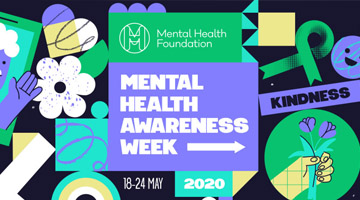 When the black dog bites
When the black dog bites
By cipreastanglia
May 18, 2020
This week (18-24 May) has been designated as Mental Health Week and – now more than ever – we’re aware of the importance of maintaining mental health, and recognising when we, or others, may be struggling.
The last CIPR State of the Profession survey revealed that 21% of public relations practitioners live with, or have previously lived with, a diagnosed mental health condition. Over half of those respondents said their work contributes highly to their diagnosis.
CIPR member Nic Wray shares some of the tips she has learned from her own experience with anxiety and depression.
As someone who has overcome serious mental health issues in the past and is ever-vigilant (not always successfully) for signs that my wellbeing is slipping, here’s some of the tips and techniques I’ve used over the last three decades to keep (mostly) happy and healthy.
Stay connected. When you’re feeling less than chipper, it’s tempting to become a hermit, and the current situation makes it very easy to avoid people. Reaching out doesn’t have to be a three hour Zoom call with all your extended family – it can be as easy as sending someone a funny meme, or a short text. Reading Twitter definitely counts, as long as you’ve curated your feed wisely. Mute and block, mute and block…
Talk about your worries. This can be the scary one. If you’re like me, there will lots of negative self-talk going on in the vein of “what makes my problems so important?” and “they’re going to think I’m a drama queen” but honestly, most people will be happy to listen. If it’s easier, when you start talking, say whether you just want to vent or whether you’re looking to bounce solutions around. If you really can’t face talking to someone you know, helplines do fantastic work. Samaritans is the best known, but CALM (for young men) and Mind are great, too.
Help others. When we can’t be kind to ourselves, we can generally be kind to other people, giving them our time, our support or our skills. Even at my lowest, I was able to volunteer for a couple of community groups. This was great not only for taking me out of myself, but building up my self-esteem and self-worth. What you do doesn’t have to be big – sharing a charity ask on social media, or checking on a neighbour are valuable too.
Get the right fuel. Some days this might mean a tub of Ben and Jerry’s, but that’s only a short term fix. Our physical health can have a big impact on how we feel, so I’m afraid the usual “healthy living” advice applies: well-balanced meals, drinking enough water, avoiding smoking and drugs, not drinking too much alcohol. But you don’t have to make too much effort –a tin of spaghetti hoops on wholemeal toast is healthy and even one of your “five a day”, apparently. Fruit juice, (bought) smoothies, soup or cereal are my go-tos when I’m down as they are low effort, and reasonably nutritious.
The E word. When you can barely lift your head from your pillow, the thought of exercise isn’t enticing. It’s not high on the list of fun things for me to do when I’m feeling fine to be honest, but I do know that a walk always makes me feel better. Especially when I really don’t want to go for one. The key here is finding an activity you enjoy, so that it doesn’t feel like a chore. My walking is usually combined with the online “treasure hunt” that is geocaching, to give me a goal to take a few more steps. Yoga is another favourite, although I usually go for the seated variety these days.
Get creative for fun. As communications and PR people, we’re used to conjuring up words, ideas or visuals on demand and to a deadline. And that does sometimes suck the joy out of creativity. I tend to choose an activity that switches the active part of my brain off, and I pick up something I can do effortlessly, leaving me free to focus mindfully on sensations such as touch, colour or repeated movements. I get this fulfilment through needles and thread or yarn, or by working in my garden, but activities such as baking, colouring in, completing jigsaws, building lego are other things to try.
Raindrops on roses. I probably spent too many rainy days as a child watching musicals on TV because both Maria in The Sound of Music and Anna in The King and I sang when they were afraid, and so do I. I sing incredibly badly, and sometimes I don’t even sing out loud, but mime theatrically. It’s impossible to cry while you are belting out your favourite upbeat numbers after the first few bars. A little dance is optional, but it ticks off something else on this list!
Professional help. There are times when you have to take stock and realise that you might need a little extra support, and the situation isn’t something you can deal with yourself. This is where the professionals come in. Your GP is the gatekeeper to NHS services and can prescribe medication to help you sleep or help your mood. Your employer may well have counselling provision available if you have an Employee Assistance Programme, and for CIPR members, the iprovision mental health hotline is available at no cost 24/7, 365 days a year.
The
iprovision hotline (you’ll need to log into your CIPR account) and more details about
support via iprovision can be found in the Benevolent fund section on the CIPR website.